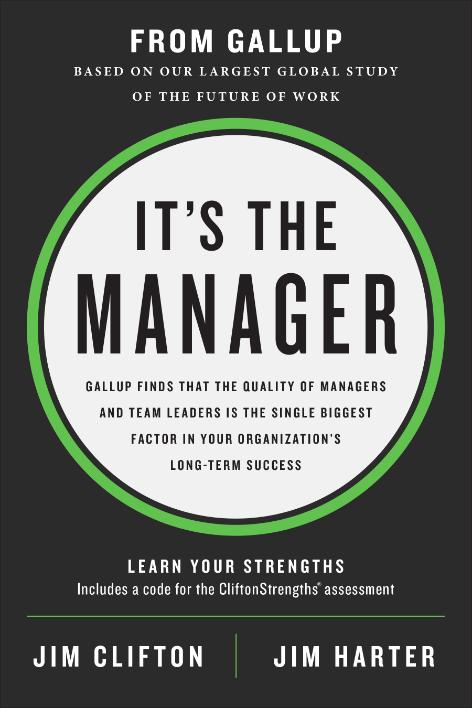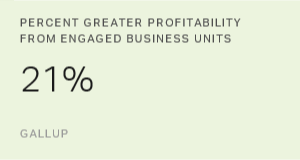Story Highlights
- "Profits and purpose are inextricably linked," says BlackRock CEO
- Interweaving purpose with company culture may require a culture change
- Focus on aligning around purpose and your managers at every level
In his annual letter to the leaders of companies that his asset management firm invests in, BlackRock CEO Larry Fink wrote, "Profits are in no way inconsistent with purpose -- in fact profits and purpose are inextricably linked."
The President and CEO of State Street Global Advisors, Cyrus Taraporevala, echoed Fink in State Street's letter to clients, sharing that a global accounting firm recently found that "'intangible assets' such as culture average 52% of an organization's market value (and in some sectors as much as 90%)."
Leaders can be left with no doubt: Increasing profit and share price are the basics. Advocating for purpose to be an integral part of an organization's culture defines successful leadership.
Astute leaders increasingly understand the effect purpose has on business outcomes. But purpose can't be limited to just a slogan. To advance, inspire and unite a company, purpose must be actualized in the day-to-day work. Gallup data show businesses have a long way to go on purpose -- but Gallup analytics show leaders how to get there.
Corporate Culture -- The Intangible Value Driver
"Culture begins with your purpose -- why you are in business," explains It's the Manager. "It lives or dies day to day through your managers. … A world-class culture inspires your most talented employees to create superior customer experiences."
Take Unilever, for instance. The formal purpose of the brand is "to make sustainable living commonplace," which informs leadership decisions in everything from investment models and acquisitions to factory waste.
The company's progress is remarkable: Unilever's sustainable living brands have outperformed the company's average growth rate for the last four years and accounted for 70% of Unilever's turnover growth in 2017. And Unilever was named as the employer of choice for fast-moving consumer goods graduates in 44 of the 52 countries the company recruits in.
A world-class culture inspires your most talented employees to create superior customer experiences.
Compare Unilever's results with this Gallup finding: Only 27% of employees strongly believe in their company's values, and less than half strongly agree that they know what makes their organization stands for and what makes it different.
Leaders should worry about that. An actionable purpose like Unilever's has a positive effect on everything a company does and such a focus on purpose unites and touches every stakeholder -- customers, employees, regulators, legislators, the media and influencers.
Indeed, Taraporevala's letter specifically states that intangible corporate assets, like corporate culture, drive "a greater share of corporate value" and allow companies to navigate "unprecedented business disruptions."
Then, he acknowledges that corporate culture, as a metric, is "difficult to measure and manage."
Difficult, but not impossible.
How to Change a Culture
Gallup's latest book, It's the Manager, pools our most groundbreaking insights from decades of research on the workplace in one spot. Its findings on purpose and workplace culture are seminal. As put succinctly in Chapter 8, to change a culture, leaders must do the following:
1. Identify your organization's purpose and brand.
The CEO, CHRO and executive committee need to clearly identify the organization's purpose -- why they are in business -- and how they want the brand to be perceived by applicants, employees and customers. Purpose and brand set the stage for everything else. Top executives need to be aligned, consistent and committed to the purpose and brand. That is the starting point for bringing teams together and effective decision-making.
2. Audit all programs and communications.
This includes human capital practices, performance management, values and rituals, and team structures for alignment and consistency with the organization's purpose and brand. Gallup has found that this can be a quick process and should be done annually.
3. Shift your managers' mindsets from being a boss to being a coach.
The culture you want can only be implemented by your best managers. A great culture is one of the few things an organization can't buy. Managers will make or break your culture change, for good or ill. By repositioning your managers from boss to coach, your organization will increase employee engagement, improve performance, and start to see the cultural shift you desire.
The engine of purpose-focused culture change takes a great deal of fuel, and it needs to come from the top. But once leaders have the machine running, the measurement and management of culture becomes vastly less difficult.
Unilever provides another sterling example. In the 1890s, Unilever's purpose was "to make cleanliness commonplace." That was an inspiring goal in the 19th century when few other soap companies could make that claim.
But the global bath soap market is now a $19.5 billion industry with a CAGR of about 5.2% -- and soap is only one of dozens of Unilever product lines that 2.5 billion people use every day. Commonplace cleanliness doesn't differentiate Unilever, and this purpose won't drive its culture.
Sustainability clearly does.
Getting more products to more people with less damage to the environment is a cultural value that workers can get behind. And Unilever's success proves BlackRock's CEO right when he says profits are in no way inconsistent with purpose: Unilever's organic sales growth is rising, its free cash flow jumped 75% in 2017, its underlying operating margin is 18.4%, and it posted $10 billion in profits in 2017.
Unilever changed its purpose when it had to. Not every company can. But then, not every company has a clearly defined purpose.
The ones that do, and act on it, have a corporate advantage. Investors like Fink and Taraporevala look for it; employees feel it. Cultures with well-defined purpose attract and keep top talent and engage workers more deeply. Engaged workers perform better, and so do their companies. Purpose is crucial to an enterprise's success.
The best leaders know that -- and the best companies follow their lead and act on it.
Discover the steps you can take to make purpose the differentiator for your organization:
- Inquire about our employee engagement solutions and start to build or strengthen your culture of engagement.
- Purchase a copy of our latest book, It's the Manager, to learn Gallup's breakthrough insights on management.
- Stay up to date with all of the latest workplace content by visiting our workplace Insights page.




